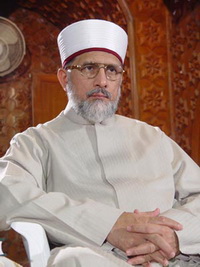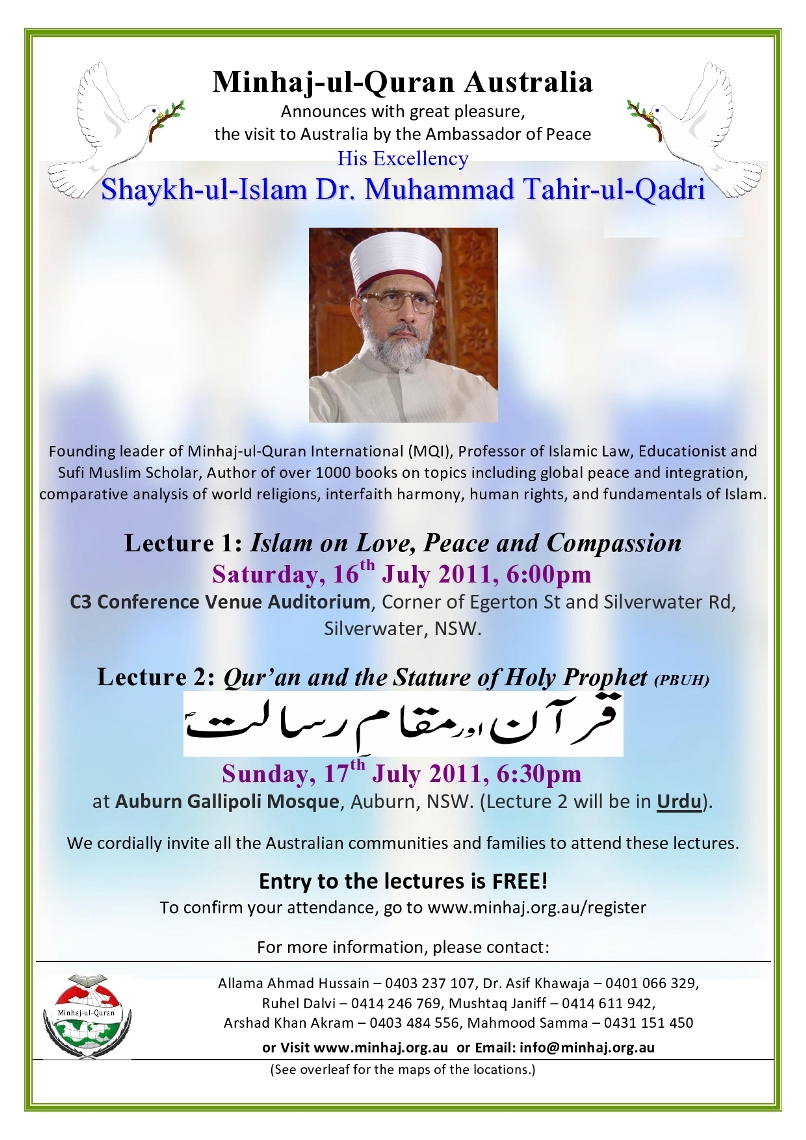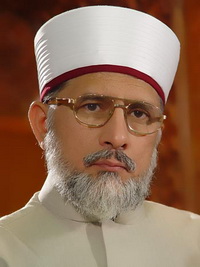
Sada-e-Watan
Sydney ™
sadaewatan@gmail.com


World known Scholar Shaykh-ul-Islam Dr.Tahir-ul-Qadri is coming to Australia
The Founder of Idara Minhaj-ul-Quran International, world known Scholar Shaykh-ul-Islam Dr. Tahir-ul-Qadri is coming to Australia. It will be his second visit of Australia. Prof. Tahir-ul-Qadri will deliver two Lectures in Sydney. His first lecture will be on Saturday, 16th July at Silverwater Sydney and 2nd will be on Sunday, 17th July at Turkish Auburn Mosque Sydney. Dr. Tahir-ul-Qadri’s first lecture will be in English and 2nd will be in Urdu. Both lectures will be start at 6pm. For more information, Please visit: www.minhaj.org.au


Muhammad Tahir ul-Qadri
Muhammad Tahir ul-Qadri was born on February 19, 1951 at Jhang, Pakistan. He is a Canada-based Pakistani Islamic Scholar and former professor of international constitutional law at the University of the Punjab.
Dr.Qadri is the founder of Minhaj-ul-Quran International, a worldwide, broad-based moderate Islamic welfare, human rights and education organization. Its objectives are the promotion of a moderate and non-extremist vision of Islam, the establishment of good relations and understanding between communities and religions, and the education of youth in classical Islam. He also founded The Minhaj University of which he is the head of the Board of Governors, as well as an international relief charity, Minhaj Welfare Foundation.Tahir Qadri is the founding chairman of the political party Pakistan Awami Tehreek (PAT). However, he is no longer involved in politics.
Prof.Qadri is the son of Farid-ud-Din Qadri. His ancestors belong to the Sial family of Jhang. Qadri started his education at the Sacred Heart School in Jhang, a Catholic mission school, where Qadri learned English and was exposed to Christianity at an early age. He began his religious education at the age of 12 in Madinah, Saudi Arabia at the Madrasa al-‘Ulūm ash-Shar‘iyya, which was situated in the house of Sayyiduna Abu Ayyub al-Ansari, the first residence of Prophet Muhammad after his migration to Madinah. He learned under Hazrat Maulana Zia-ud-Din Madani and studied Hadith from al-Sayyid Alawi al-Malik. He then received Ijaza. He continued his religious education with his father and other scholars, and completed Dars-e-Nizami and Dars-e-Hadith.
He studied law at the University of the Punjab, Lahore where he graduated with an LLB in 1974, gaining a Gold Medal for his academic performances.[citation needed] Following a period of legal practice as an advocate, he taught law at the University of the Punjab from 1978 to 1983 and then gained his PhD in Law from the same university in 1986. He was appointed as a professor of Law at the University of Punjab, where he taught British, US and Islamic constitutional law.
Dr. Tahir was appointed as a jurist consultant (legal adviser) on Islamic law for the Supreme Court and the Federal Shariat Court of Pakistan and also worked as a specialist adviser on Islamic curricula for the Federal Ministry of Education (Pakistan). At various times between 1983 and 1987, he received and declined offers for various high-level posts.
Allama qadri has delivered more than 6,000 lectures on economy and political studies, religious philosophy, law, Sufism, medical sciences, material sciences and astronomy. Numerous lectures are available in Urdu, English and Arabic at different Islamic Shops around the world. Qadri has himself given ijazah to a number of leading Muslim scholars, making them his students, linking them through himself back to the prophet Muhammad.
In 2006, Qadri was a keynote speaker at the Muslims of Europe Conference in Istanbul, Turkey to discuss identity, citizenship, and challenges and opportunities for European Muslims.[
In March 2010 he gained media attention for the launch of his unconditional Fatwa on Terrorism and appeared on various international media outlets including Sky News, BBC News, ITV, EuroNews, Al-Jazeera, CNN and CNN's Amanpour, CBC News, Russia Today, Al Arabiya and various other outlets.He appread on Frost Over The World in which he was interviewed by Sir David Frost and Qadri said the 'purpose of his life is to bring peace and harmony in the world. The US State Department declared the Fatwa to be a significant publication which takes back Islam from terrorists.
Tahir Qadri was quoted in the American Foreign Policy magazine as "I am trying to bring [the terrorists] back towards humanism. This is a jihad against brutality, to bring them back towards normality. This is an intellectual jihad."
In August 2010 Qadri held the first anti-terrorism camp for Muslim youth at the University of Warwick with the aim of tackling extremism in the UK. The camp was organised by his organisation Minhaj-ul-Quran UK which has established 572 schools, a number of colleges and a chartered university.He is referred to as Shaykh-ul-Islam by many scholars and his own supporters for being a world authority on Islam.
In January 2011 Qadri was invited to speak at the World Economic Forum in Davos on the topic of "The Reality of Terrorism".[
Foundation of Minhaj-ul-Quran
Qadri founded a moderate and anti-extremist organisation Minhaj-ul-Quran International in October 1981 and spent the next decade expanding it nationally and internationally.
Views
He argues that terrorists have left the true, classical teachings of Islam and that their rebellious spirit of violence and religious extremism is a continuity of the Khawarij. Qadri was one of the religious leaders in Pakistan to condemn the terrorist attacks on September 11, 2001. He has denounced and severely condemned Osama bin Ladin.
Qadri refutes the division of the world into two categories Dar al-Islam (the abode of Islam) and Dar al-harb (the abode of war) and that the west being the latter, which has been taught by various scholars including Ibn Taymiyah which is one of the reasons why radicals misuse this concept. Qadri has briefly explained this concept in his Fatwa on Terrorism. He divides the world into five categories and believes the west is similar to Dar al-Islam due to the freedom of religions and based on the international law. Qadri has commented: "All these Western countries - Britain, Europe, North America, wherever you are living - since you are enjoying all rights, all freedoms according to the constitution as other non-Muslim communities are enjoying, there is no difference. And I would have no hesitation in saying you are enjoying the rights and freedoms much better than in many other Muslim and Arab countries."
He describes terrorism as an "ideological infection" and believes that, through his anti-terrorism summer camps, "we are fighting on the ideological, philosophical, theological and academic fronts. We are trying to educate young people."
He expressed concern when cartoons depicting the Prophet Muhammad were published in newspapers around Europe and sent out a memorandum called 'A call to prevent a clash of civilizations'.
Reuters featured Qadri in August 2009 as a leading Sufi scholar who is working to bring the western youth away from extremism towards moderate Islam and to combat extreme tendencies.
After the December 2009 Rawalpindi attack he was quoted as saying: "Suicide attacks are not allowed in Islam, these actions are un-Islamic. The slaughter of human beings in any religion or country, and terrorism in all its manifestations, are totally in contradiction with the teachings of Islam."
On 2 March 2010, Qadri issued a 600-page Fatwa on Terrorism, which is an "absolute" scholarly refutation of all terrorism without "any excuses or pretexts." He said that "Terrorism is terrorism, violence is violence and it has no place in Islamic teaching and no justification can be provided for it, or any kind of excuses or ifs or buts." Qadri said his fatwa, which declares terrorists and suicide bombers to be unbelievers, goes further than any previous denunciation.
On 9 September 2010, Qadri wrote a letter to the U.S. President Barack Obama in response to the controversial 'Burn a Quran Day' urging him to stop this incident from happening. Qadri wrote in an article published on the CNN website: "If this event had gone ahead it would not be less than 9/11 in the sense of far-reaching consequences and after-effects." he added: "A handful of individuals, it does not matter whether they are related to mosque or church, cannot be given the right to flippantly play about with peaceful co-existence, and their so-called sentiments cannot be preferred over global peace."
The US Congress funded think-tank United States Institute of Peace hosted Qadri in November 2010 to speak about his struggle against radicalism in Islam in light of his Fatwa on Terrorism.
Dr.Qadri states in his Fatwa on Terrorism:
"The importance Islam lays on the sanctity and dignity of human life can be gauged from the fact that Islam does not allow indiscriminate killing even when Muslim armies are engaged in war against enemy troops. The killing of children, women, the old, infirm, religious leaders and traders is strictly prohibited. Nor can those who surrender their arms, confine themselves to their homes and seek shelter of anyone be killed. The public cannot be massacred. Likewise, places of worship, buildings, crops and even trees cannot be destroyed. On the one hand, there is a clear set of Islamic laws based on extreme discretion, and on the other, there are people who invoke the name of Islam to justify the indiscriminate killing of people, children, and women everywhere, without any distinction of religion or identity. It is a pity that such barbaric people still refer to their activities as Jihad. There can be no bigger discrepancy than this to be seen on earth. It can in no way be permissible to keep foreign delegates under unlawful custody and murder them and other peaceful non-Muslim citizens in retaliation for the interference, unjust activities and aggressive advances of their countries. The one who does has no relation to Islam and the Holy Prophet (blessings and peace be upon him)."
Views on an Islamic State
Qadri views an Islamic state as a Muslim-majority country which respects freedom, the rule of law, global human rights (including religious freedom), social welfare, women's rights and the rights of minorities.
He also claims that the first constitution of Madinah "declared the state of Madinah as a political unit”. He also mentions that the constitution declared the "indivisible composition of the Muslim nation (Ummah)".
With respect to constitutions, Tahir ul-Qadri says: "This was the constitution, which provided the guarantee of fundamental human rights in our history." He believes that "a constitution is a man-made law and by no means it can be declared superior to a God-made law."
He believes in the Sovereignty of God’s law, that the Qur'an and Sunnah equates to State law, and that Islam encourages political activity. Tahir ul-Qadri sees Islam as a faith which allows political participation. He believes in democracy and human rights, and argues that rights are defined by Islam in Quran and Sunnah.
Published Works:
He has authored some 400 published works in Arabic, English and Urdu. Amongst his notable and recent works are:
“Dala’il al-Barakat” (10,000 Durood and Salawaat in praise of Muhammad, written in the style of the well-read Dala’il al-Khayrat of Imam Jazuli, which was written nearly 1,000 years ago),
“Minhaj us Sawi’” (A Hadith compendium in 2 volumes compiled in the pattern and style of Imam Nawawi’s “Riyad us-Salihin and Khatib Tabrizi’s “Mishkat al-Masabih” Consisting of approximately 1,000 pages),
“Mawlid an-Nabi”, the largest ever written work on the subject of Mawlid, consisting of approximately 1,000 pages.
The entire income of Qadri’s published books, DVDs/CDs of his lectures is dedicated forever on his behalf to his organisation Minhaj-ul-Quran International which is usually published inside his books.
English works include:
Political Career
On May 25, 1989, Qadri founded a political party Pakistan Awami Tehreek or PAT. The main aims of this political party were to introduce the culture of true democracy, economic stability, improve the state of human rights, justice and the women's role in Pakistan. Pakistan Awami Tehreek (PAT) other aim was to remove corruption from Pakistani politics.
In 1990, Pakistan Awami Tehreek (PAT) participated in the national elections just one year after it was founded. In 1991, PAT and TNFJ (Tehreek-e-Nifas-e-Fiqh-e-Jafria A shia political group) now known as Tehreek-e-Jafria signed a 'Communique of Unity' in order to promotes social and religious harmony. In another creative move, PAT for the first time in the political history of Pakistan, introduced an idea of "working relationship" between the three national political forces, PAT, TNFJ and Tehreek-e-Istaqlal.
From 1989 to 1993, Qadri continuously worked as an opposition leader tying to indicate the government's mistakes and to suggest ways for improving the situation in the political, educational, and economical fields. In 1992 he presented a complete working plan for interest-free banking in Pakistan covering all kinds of national and international transaction which was recognized and appreciated by all sections of the society including industrial and banking professionals. PAT offices were also opened in major foreign countries.
Dr.Qadri continued his research alongside his political career and, in 1996 he presented a thesis on the utilization of an observatory for moon sighting based on the more recent scientific findings.He was elected as an MNA (Member of the National Assembly) of his Lahore constituent on the Pakistani National Parliament.